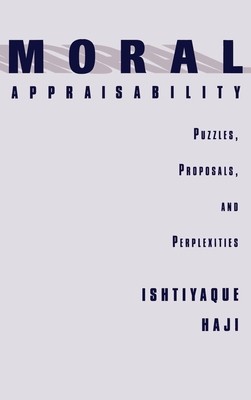
- We will send in 10–14 business days.
- Author: Ishtiyaque Haji
- Publisher: Oxford University Press, USA
- ISBN-10: 0195114744
- ISBN-13: 9780195114744
- Format: 16.5 x 24.1 x 2.3 cm, kieti viršeliai
- Language: English
- SAVE -10% with code: EXTRA
Reviews
Description
This book explores a central question of moral philosophy, addressing whether we are morally responsible for certain kinds of actions, intentional omissions, and the consequences deriving therefrom.
Haji distinguishes between moral responsibility and a more restrictive category, moral appraisability. To say that a person is appraisable for an action is to say that he or she is deserving either of praise or blame for that action. One of Haji's principal aims is to uncover conditions sufficient for appraisability of actions. He begins with a number of puzzles that serve to structure and organize the issues, each one of which motivates a condition required for appraisability. The core of Haji's analysis involves his examination of three primary types of conditions. According to a control condition, a person must control the action in an appropriate way in order to be appraisable. An autonomy condition permits moral appraisability for an action only if it ultimately derives from a person's authentic evaluative scheme. On Haji's epistemic requirement, moral praiseworthiness or blameworthiness demands belief on the part of the agent in the rightness or wrongness of an action. Hajiconcludes this portion of his argument by incorporating these conditions into a general principle which outlines sufficient conditions for appraisability. Haji offers a fascinating discussion of the implications of his analysis. He demonstrates that his appraisability concept is applicable to a variety of non-moral kinds of appraisal, such as those involving legal, prudential and etiquette considerations. He looks at crosscultural attributions of blameworthiness and argues that such attributions are frequently mistaken. He considers the case of addicts and suggests that they may not be morally responsible for actions their addictions are said to cause. He even takes up the intriguing question of whether we can be blamed for the thoughts of our dream selves. Engaging with a central metaphysical question in his conclusion, Haji argues that the conditions of moral responsibility he defends are neither undermined by determinism nor threatened by certain varieties of incompatibilism. Addressing a range of little-discussed topics and forging crucial connections between moral theory and moral responsibility, Moral Appraisability is vital reading for students and scholars of moral philosophy, metaphysics, and the philosophy of law.
EXTRA 10 % discount with code: EXTRA
The promotion ends in 21d.16:26:42
The discount code is valid when purchasing from 10 €. Discounts do not stack.
- Author: Ishtiyaque Haji
- Publisher: Oxford University Press, USA
- ISBN-10: 0195114744
- ISBN-13: 9780195114744
- Format: 16.5 x 24.1 x 2.3 cm, kieti viršeliai
- Language: English English
This book explores a central question of moral philosophy, addressing whether we are morally responsible for certain kinds of actions, intentional omissions, and the consequences deriving therefrom.
Haji distinguishes between moral responsibility and a more restrictive category, moral appraisability. To say that a person is appraisable for an action is to say that he or she is deserving either of praise or blame for that action. One of Haji's principal aims is to uncover conditions sufficient for appraisability of actions. He begins with a number of puzzles that serve to structure and organize the issues, each one of which motivates a condition required for appraisability. The core of Haji's analysis involves his examination of three primary types of conditions. According to a control condition, a person must control the action in an appropriate way in order to be appraisable. An autonomy condition permits moral appraisability for an action only if it ultimately derives from a person's authentic evaluative scheme. On Haji's epistemic requirement, moral praiseworthiness or blameworthiness demands belief on the part of the agent in the rightness or wrongness of an action. Hajiconcludes this portion of his argument by incorporating these conditions into a general principle which outlines sufficient conditions for appraisability. Haji offers a fascinating discussion of the implications of his analysis. He demonstrates that his appraisability concept is applicable to a variety of non-moral kinds of appraisal, such as those involving legal, prudential and etiquette considerations. He looks at crosscultural attributions of blameworthiness and argues that such attributions are frequently mistaken. He considers the case of addicts and suggests that they may not be morally responsible for actions their addictions are said to cause. He even takes up the intriguing question of whether we can be blamed for the thoughts of our dream selves. Engaging with a central metaphysical question in his conclusion, Haji argues that the conditions of moral responsibility he defends are neither undermined by determinism nor threatened by certain varieties of incompatibilism. Addressing a range of little-discussed topics and forging crucial connections between moral theory and moral responsibility, Moral Appraisability is vital reading for students and scholars of moral philosophy, metaphysics, and the philosophy of law.


Reviews